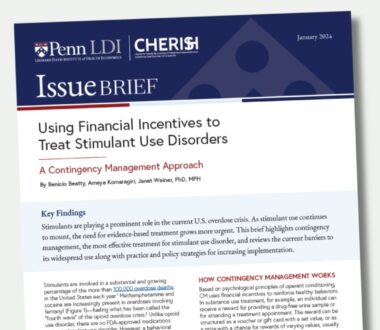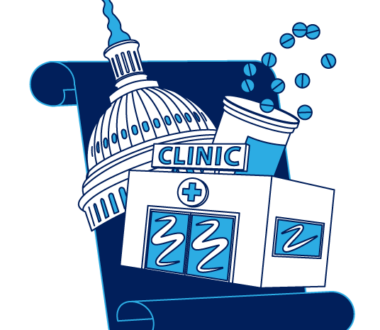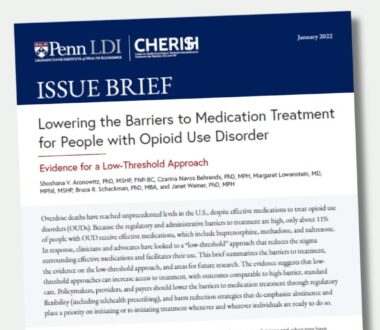
Stigma and Sluggish Bureaucracy Block Treatment for Stimulant Use Disorder
So, imagine there’s a runaway epidemic of overdose deaths that involve non-opioid drugs and that we’ve had an evidence-based therapy for this unique addiction for the last forty years—but for reasons largely grounded in legislators’ and the public’s visceral disdain for people who use substances, we have refused to nationally recognize or widely implement this […]

Using Financial Incentives to Treat Stimulant Use Disorders
Stimulants are involved in a substantial and growing percentage of the more than 100,000 overdose deaths in the United States each year. Methamphetamine and cocaine are increasingly present in overdoses involving fentanyl—fueling what has been called the “fourth wave” of the opioid overdose crisis. Unlike opioid use disorder, there are no FDA-approved medications to treat […]

Many State Medicaid Programs Still Require Prior Authorization for Buprenorphine Treatment for Opioid Use Disorder
The opioid epidemic has been an ongoing public health crisis in the United States, claiming countless lives and devastating communities. Buprenorphine, a highly effective medication for the treatment of opioid use disorders, holds the potential to save lives. However, a significant hurdle exists in the form of prior authorization requirements, which are associated with lower access to […]

LDI Experts Analyze the New U.S. Plan to Target Xylazine-Laced Fentanyl
The lethal mixture of xylazine and fentanyl, also known as Tranq dope, may sound unfamiliar to many, but its impact is harming people who use drugs nationwide. Xylazine, approved by the U.S. Food and Drug Administration for veterinary use as a sedative, has become a major component in the illicit drug trade. When consumed by humans, xylazine causes […]

Will States and Counties Spend Their National Opioid Settlements Effectively?
As $54 billion in National Opioid Settlement funds begin moving out toward states, counties, and municipalities, there is widespread concern among health authorities that the legal victory does not become a repeat of the 1998 mega-billion-dollar Tobacco Master Settlement Agreement fiasco in which most states used the money for just about everything except tobacco cessation […]

New Federal Rules That Lower Barriers to Opioid Care Could Save Thousands of Lives
The two main medications that treat opioid use in the United States reduce overdose deaths by 50%. Yet fewer than one in 10 people with opioid use disorder (OUD) can access this kind of medical protocol, according to the Centers for Disease Control and Prevention (CDC). Fortunately, a new law and a new federal regulation […]

A Catch-Up on Promising Efforts to Mitigate the Opioid Crisis
For the last 20 years or so, the U.S. has seen a significant increase in opioid and drug overdoses overall. And while there was a slight leveling before the pandemic, “we’ve seen huge increases since COVID-19,” said Margaret Lowenstein, an LDI Senior Fellow, addiction medicine physician, and an Assistant Professor of Medicine at the Perelman School of […]

Advancing Evidence-Based Substance Use Disorder Treatment Policies
If you want to reform state laws to require detox facilities to include medications like buprenorphine and methadone in their treatments, you should start by changing the “hearts and minds” of those who oppose it, Rebekah Gee, MD, MPH, MHSPR, told the January 14, 2022 Penn LDI/CHERISH Virtual Conference at the University of Pennsylvania. Keynoting a gathering organized […]

Lowering the Barriers to Medication Treatment for People with Opioid Use Disorder
Overdose deaths have reached unprecedented levels in the U.S., despite effective medications to treat opioid use disorders (OUDs). Because the regulatory and administrative barriers to treatment are high, only about 11% of people with OUD receive effective medications, which include buprenorphine, methadone, and naltrexone. In response, clinicians and advocates have looked to a “low-threshold” approach […]

COVID-19 Can Change The Way We Respond To The Opioid Crisis – For The Better
The Coronavirus (COVID-19) pandemic has brought unprecedented challenges in healthcare delivery to people who use drugs. However, it may also have provided impetus to precipitate innovative changes in providing opioid overdose prevention, syringe services, and medication for opioid use disorder (MOUD) to this vulnerable population. In a new Viewpoint in Psychiatric Services, CHERISH Research Affiliate Yuhua Bao from […]

Revisions to 42 CFR Patient Confidentiality Rules for Substance Use Disorder: What It Means for Health Services Researchers
In August 2019 the United States Substance Abuse and Mental Health Services Administration (SAMHSA) proposed a revision to the Federal rule that protects patient confidentiality for people with substance use disorders, referred to as 42 CFR Part 2. The sixty day comment period has ended and comments are currently under consideration. This proposal seeks to facilitate disclosure […]

Progress of “Netflix” subscription model negotiations to pay for HCV Treatment
In 2018, the state of Louisiana spent approximately $35 million to treat 1,000 individuals with chronic Hepatitis C Virus (HCV). Unfortunately, these 1,000 treated individuals comprise only about 1% of the state’s 90,000 individuals living with HCV, including about 39,000 covered by the state’s Medicaid program or prison system. Treating everyone would cost more than […]
Engage with CHERISH
Submit a Consultation Request or Contact Us to learn more about how CHERISH can support your research or policy goals.